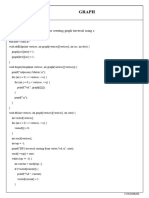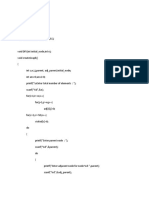0% found this document useful (0 votes)
19 views5 pagesBFS DFS Graph Programs
The document provides C programs for graph traversal using both adjacency matrix and adjacency list representations. It includes implementations for Breadth-First Search (BFS) and Depth-First Search (DFS) for both representations, demonstrating how to traverse a graph starting from a specified node. Each section includes code snippets and explanations for setting up the graph and executing the traversal algorithms.
Uploaded by
satya.alugolu6511Copyright
© © All Rights Reserved
We take content rights seriously. If you suspect this is your content, claim it here.
Available Formats
Download as DOCX, PDF, TXT or read online on Scribd
0% found this document useful (0 votes)
19 views5 pagesBFS DFS Graph Programs
The document provides C programs for graph traversal using both adjacency matrix and adjacency list representations. It includes implementations for Breadth-First Search (BFS) and Depth-First Search (DFS) for both representations, demonstrating how to traverse a graph starting from a specified node. Each section includes code snippets and explanations for setting up the graph and executing the traversal algorithms.
Uploaded by
satya.alugolu6511Copyright
© © All Rights Reserved
We take content rights seriously. If you suspect this is your content, claim it here.
Available Formats
Download as DOCX, PDF, TXT or read online on Scribd
/ 5





























































































